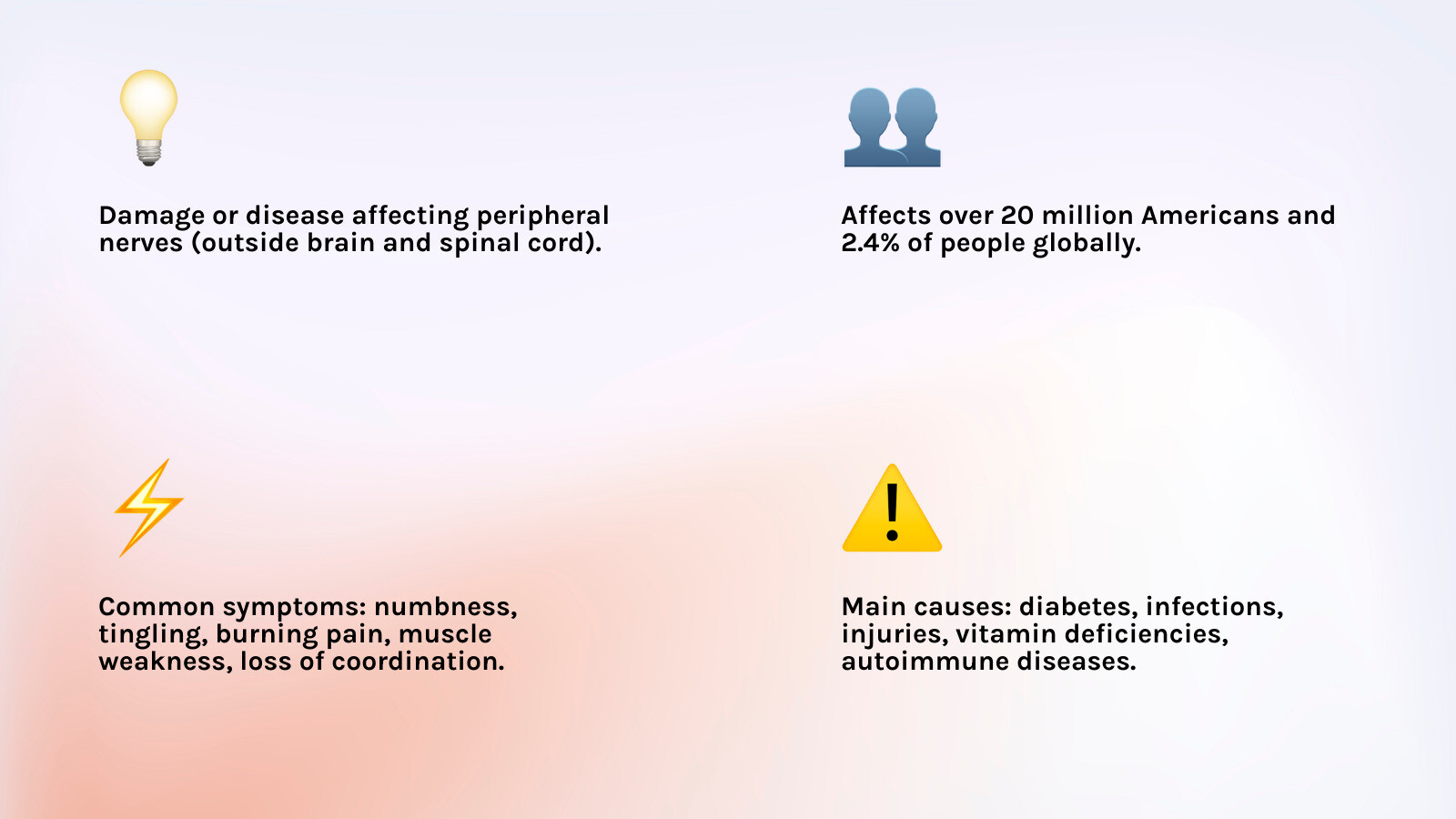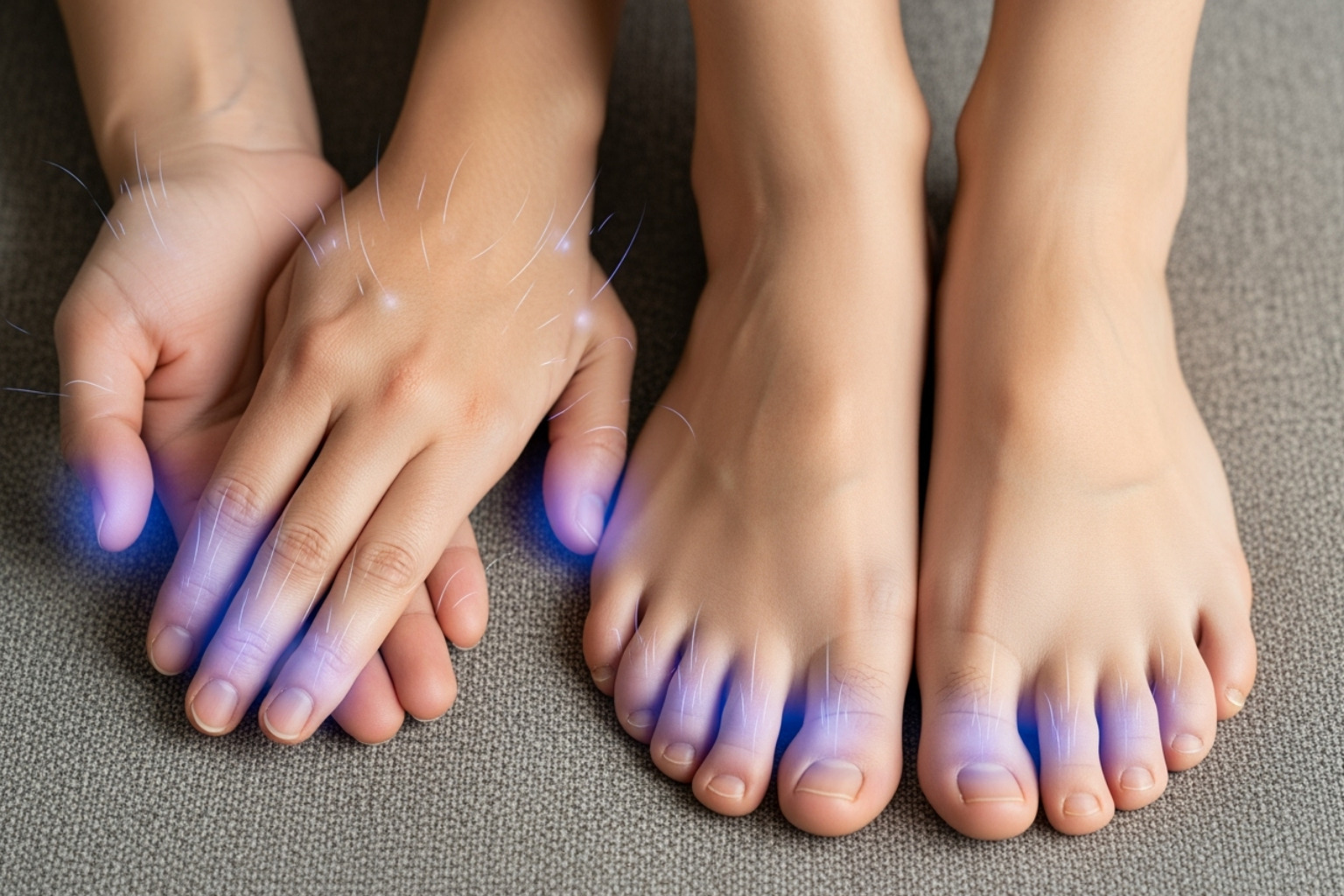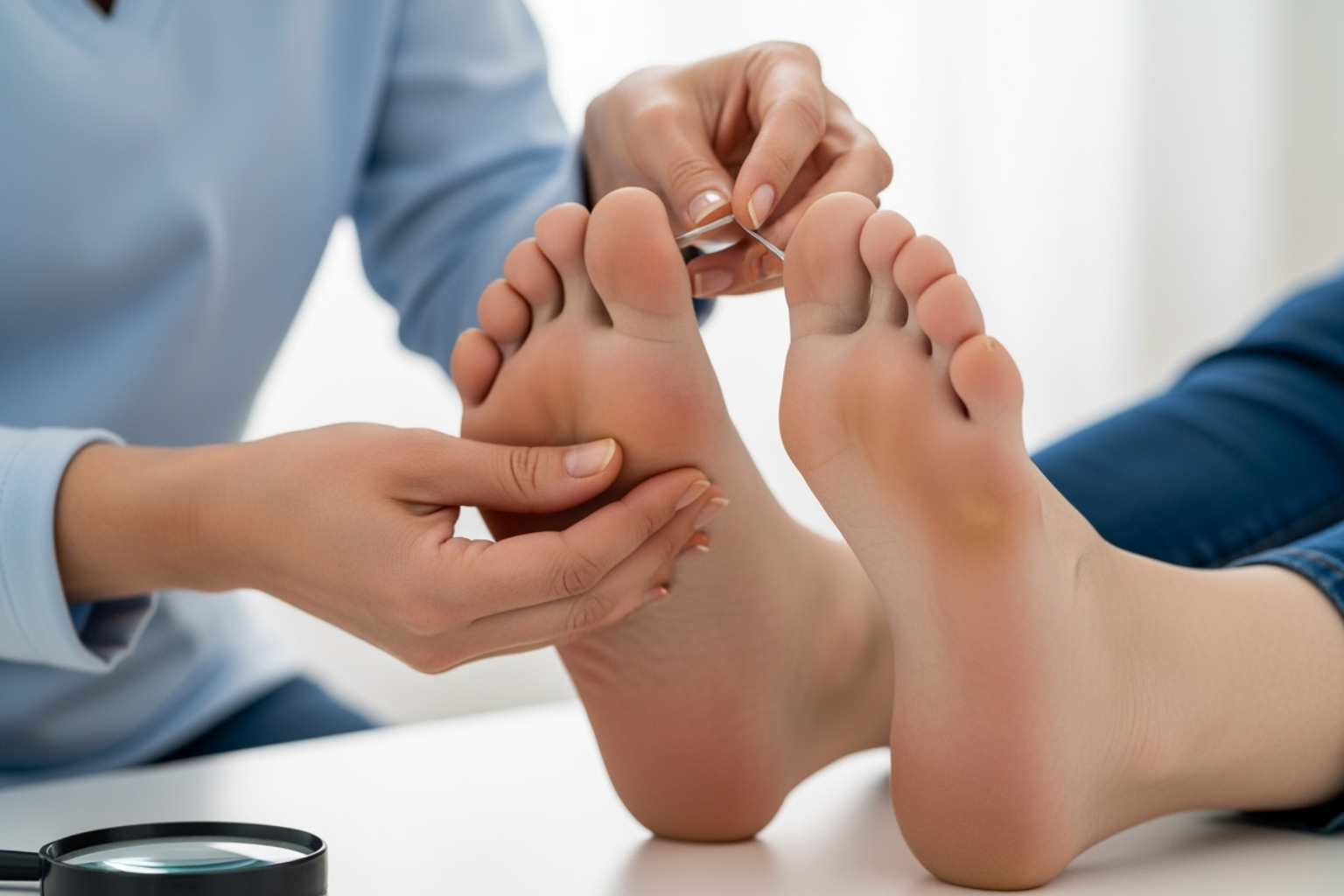Understanding Nerve Damage and Its Impact on Your Body
What is neuropathy? It's a medical term for nerve damage. Your nerves act as communication lines between your brain and the rest of your body. When damaged, they can't send signals properly, leading to symptoms like numbness, tingling, pain, and weakness, often in the hands and feet.
Quick Facts About Neuropathy:
- Definition: Damage or disease affecting the peripheral nerves (nerves outside the brain and spinal cord)
- Prevalence: Affects more than 20 million Americans and about 2.4% of people globally
- Common Symptoms: Numbness, tingling, burning pain, muscle weakness, loss of coordination
- Main Causes: Diabetes, infections, injuries, vitamin deficiencies, autoimmune diseases, toxins
- Types: Motor (muscle control), Sensory (feeling/sensation), Autonomic (automatic body functions)
Neuropathy is an umbrella term for many types of nerve damage. Symptoms vary depending on which nerves are affected and the underlying cause.
While challenging, understanding nerve damage is the first step to managing it. Many find relief through medical treatments, lifestyle changes, and targeted therapies like topical creams for nerve pain.
I'm Tony Enrico. Through my work with Neuropasil, I've helped people understand what is neuropathy and find relief. I've seen how the right knowledge and treatment can restore comfort and quality of life.

Know your what is neuropathy terms:
So, What is Neuropathy and How Does It Affect the Nervous System?
Think of your nervous system as your body's electrical wiring. The brain and spinal cord are the control panel, and peripheral nerves are the wires. With neuropathy, these wires are damaged, causing signals to get scrambled or lost.
The central nervous system (your brain and spinal cord) is mission control, while the peripheral nervous system consists of all the nerves branching out to your limbs and organs. When these peripheral nerves are damaged, communication breaks down. Signals can misfire, causing pain without injury, or fail completely, causing numbness.
The experience varies, from a constant tingling to sharp, burning pain that disrupts daily life. Its unpredictability is often the hardest part.
This isn't a rare condition. More than 20 million Americans live with some form of neuropathy. Globally, about 2.4% of people experience it, with that number rising to 8% for those over age 55.
Understanding which nerves are affected is key to finding the right treatment.
The Different Types of Neuropathy
Symptoms depend entirely on which nerves are damaged.
Sensory nerves transmit sensations like touch, temperature, and pain. Damage can cause numbness, tingling, burning, sharp pains, or extreme sensitivity, as if the nerves are sending false alarms.
Motor nerves control voluntary muscles. Damage leads to weakness, cramping, twitching, and poor coordination, making simple tasks difficult.
Autonomic nerves manage involuntary functions like heart rate, digestion, and blood pressure. Damage can cause dizziness, digestive problems, sweating issues, and bladder or sexual dysfunction.
Many people have combination neuropathy, affecting multiple nerve types. Mononeuropathy affects a single nerve (e.g., carpal tunnel syndrome), while polyneuropathy, the most common form, affects multiple nerves symmetrically, often starting in the feet and hands.
| Nerve Type | Main Function | Common Symptoms When Damaged |
|---|---|---|
| Motor | Controls voluntary muscle movement | Muscle weakness, cramps, twitching, loss of coordination, paralysis |
| Sensory | Transmits sensations (touch, pain, temperature) | Numbness, tingling, burning pain, electric shock sensations, extreme sensitivity |
| Autonomic | Controls involuntary body functions (heart rate, digestion, etc.) | Dizziness, digestive issues, bladder problems, excessive sweating, heat intolerance, sexual dysfunction |
Common Causes of Nerve Damage
Identifying the cause is a crucial step toward effective treatment.
Diabetes is the leading cause. High blood sugar damages nerves over time, and according to the NIDDK, up to half of all people with diabetes will develop neuropathy. Our article on Diabetic Neuropathy Explained: Navigating Nerve Pain with Diabetes offers more guidance.
Autoimmune diseases like Lupus, Rheumatoid Arthritis, and Guillain-Barré syndrome can cause the immune system to attack healthy nerve tissue.
Infections such as shingles, Lyme disease, HIV/AIDS, and hepatitis B and C can directly damage nerves.
Traumatic injuries from accidents, falls, or repetitive stress can compress, crush, or sever nerves.
Vitamin deficiencies, especially in B vitamins (B1, B6, B12) and Vitamin E, can erode nerve health.
Chronic alcohol abuse is toxic to nerves and often leads to thiamine (B1) deficiency, compounding the damage.
Toxins and heavy metals like lead, arsenic, and mercury, as well as certain industrial chemicals, can cause nerve damage.
Medications, especially certain chemotherapy drugs, antibiotics, and cardiovascular drugs, can damage nerves as a side effect.
Tumors can physically press on nerves or cause neuropathy as a consequence of the cancer or its treatment.
Inherited disorders, such as Charcot-Marie-Tooth disease, cause progressive nerve damage due to genetic factors.
Other conditions like kidney disease, liver disease, and thyroid disorders can contribute to neuropathy.
In up to 30% of cases, the cause is unknown. This is called idiopathic neuropathy, but it is still treatable.
For a full list of causes, see our A-Z Guide to Neuropathy Causes.
Symptoms, Diagnosis, and Potential Complications
Living with neuropathy means dealing with unpredictable signals from your body. It impacts every aspect of daily life, affecting physical comfort, emotional well-being, and independence.

Understanding the Symptoms: What is Neuropathy Like?
When people ask what is neuropathy is like, the symptoms often start gradually in the hands and feet as a persistent tingling or "pins and needles" sensation. This can spread upward in a "stocking-glove" pattern.
- Numbness makes it hard to feel the ground or handle objects. This is dangerous, as you might not notice injuries like cuts or burns.
- Pain is a common symptom, ranging from a constant burning sensation to sudden, sharp, jabbing pains that feel like electric shocks.
- Muscle weakness can cause heavy-feeling limbs, foot drop (difficulty lifting the front of the foot), a weak grip, and poor coordination and balance.
- Extreme sensitivity to touch (allodynia) can make even a light touch from bedsheets painful.
- Damage to autonomic nerves can cause dizziness, digestive problems, bladder issues, abnormal sweating, and sexual dysfunction.
These symptoms can be overwhelming and interfere with work, social life, and sleep. To learn more, explore our article on Peripheral Neuropathy Symptoms.
Diagnosing the Problem: What is Neuropathy Diagnosis Involving?
Diagnosing neuropathy involves detective work to find the underlying cause. The process starts with a detailed discussion of your symptoms, medical history, and lifestyle.
A physical and neurological exam follows, where your doctor checks reflexes, muscle strength, balance, coordination, and your ability to feel sensations like light touch, vibration, and temperature.
Blood tests can identify underlying causes like diabetes, vitamin deficiencies, kidney or liver disease, autoimmune disorders, or infections.
For a closer look at nerve function, doctors may use:
- Nerve conduction study (NCS): Measures the speed and strength of electrical signals in your nerves to confirm damage.
- Electromyography (EMG): Records electrical activity in muscles to determine if weakness is caused by nerve or muscle problems.
In some cases, imaging tests like an MRI can find structural issues pressing on nerves. Rarely, a nerve biopsy, where a small piece of nerve is examined, may be used to identify specific damage.
Potential Complications
Proactive management is key to avoiding serious complications, as outlined by authoritative sources like the Mayo Clinic.
Foot ulcers and infections are a major risk. Numbness can prevent you from noticing minor injuries, which can become infected and, in severe cases, lead to amputation. Daily foot inspection is critical. Our guide to foot treatment offers prevention strategies.
The risk of falls increases due to muscle weakness, numbness, and poor coordination. Falls can lead to serious injuries like fractures, especially in older adults.
Chronic pain can lead to sleep deprivation, anxiety, and depression, significantly impacting mental health and quality of life.
Decreased mobility and independence can result as symptoms progress, making daily tasks difficult and sometimes requiring assistive devices.
Severe autonomic dysfunction can be life-threatening, leading to abnormal heart rhythms, malnutrition from digestive issues, or kidney damage from bladder problems.

Managing Neuropathy: Treatments and Lifestyle Changes
After a diagnosis of what is neuropathy, managing it involves a comprehensive approach combining medical treatments and lifestyle changes. The goal is to treat the underlying cause, relieve symptoms, and maintain your quality of life. The Mayo Clinic provides an authoritative overview of treatments that aligns with this approach.
Medical Treatments and Therapies
Your healthcare team may recommend several options to manage symptoms.
Medications are a cornerstone of treatment. While over-the-counter pain relievers help with mild pain, prescription antidepressants and anti-seizure medications (like gabapentin and pregabalin) are more effective for nerve pain by calming overactive nerve signals.
Physical therapy helps strengthen muscles, improve balance, and increase mobility, reducing the risk of falls.
Transcutaneous electrical nerve stimulation (TENS) is a drug-free therapy that uses gentle electrical pulses to block pain signals.
Occupational therapy helps you adapt to daily life challenges, teaching new ways to perform tasks and recommending assistive devices to maintain independence.
Most importantly, treatment focuses on the underlying cause. This could mean controlling blood sugar for diabetes, taking supplements for a vitamin deficiency, or using immune-modulating therapies for autoimmune conditions.
Lifestyle Adjustments and Home Care
Daily choices often have the biggest impact on how you feel.
- Healthy Diet: A balanced diet rich in fruits, vegetables, lean proteins, and B vitamins supports nerve health.
- Regular Exercise: Activities like walking or swimming improve blood flow to nerves, strengthen muscles, and improve balance.
- Avoid Alcohol and Smoking: Quitting is crucial, as both are toxic to nerves and can worsen neuropathy.
- Blood Sugar Control: For those with diabetes, strict blood sugar control is the most effective way to prevent further nerve damage.
- Foot Care: Inspect your feet daily for injuries and wear protective, well-fitting shoes to prevent infections. Our guide on foot treatment explains this in detail.
- Topical Treatments: Topical creams like Neuropasil offer targeted relief. Applying a cream with ingredients like Aloe, Urea, and Menthol directly to painful areas can soothe discomfort without the side effects of oral medications. They are especially helpful at night. You can learn more about finding the right cream and our ingredients.
- Stress Management: Techniques like meditation, deep breathing, or gentle yoga can help break the cycle of pain and stress.
Managing neuropathy is a journey. With the right combination of treatment, lifestyle changes, and targeted relief like Neuropasil's nerve pain relief cream, you can find comfort and maintain an active life.
Frequently Asked Questions about Neuropathy
When learning about what is neuropathy, many questions arise. Here are answers to the most common ones.
Can neuropathy be reversed or cured?
The ability to reverse neuropathy depends on its cause. If caused by a treatable condition like a vitamin deficiency, nerve damage can sometimes be reversed. Peripheral nerves can regenerate, but the process is slow, making early treatment vital. For chronic conditions like long-standing diabetic neuropathy, a complete cure may be unrealistic. However, treatment can manage symptoms, prevent worsening, and significantly improve your quality of life.
When should you see a doctor for neuropathy symptoms?
You should see a doctor as soon as you notice persistent symptoms like unusual tingling, numbness, weakness, or pain in your hands or feet. A sudden onset or rapid worsening of symptoms requires prompt medical attention. If you experience severe symptoms like difficulty breathing or swallowing, seek emergency care. Early diagnosis is key to preventing irreversible damage.
Is neuropathy a serious condition?
Yes, neuropathy can be serious due to its potential complications. Risks include non-healing foot ulcers that can lead to amputation, falls from weakness or numbness, and life-threatening issues from autonomic neuropathy (which affects heart rate and blood pressure). Neuropathy is also often a sign of a serious underlying disease like diabetes or an autoimmune condition. However, proactive management can significantly reduce these risks and help you live a full, active life.
Conclusion: Living a Full Life with Neuropathy
Understanding what is neuropathy is the first step toward managing it. While it's a challenging condition, it doesn't have to control your life. By working with your healthcare team and adopting proactive lifestyle changes, you can manage symptoms and prevent complications.
At Neuropasil, our mission is to support you on this journey. Our topical creams, with natural ingredients like Aloe, Urea, and Menthol, provide fast-acting, targeted relief for nerve pain without the side effects of oral medications. Many users find that reliable topical relief helps them sleep better, move more comfortably, and reclaim their lives.
Living with neuropathy is about adapting, not surrendering. With the right support and effective relief, you can maintain your independence and enjoy life on your terms. Don't let nerve pain write your story. Explore our nerve pain relief solutions and find how targeted topical relief can help you take back control and live more comfortably.
You're not alone in this journey. Millions of people are successfully managing neuropathy every day, and with the knowledge you now have, you're well-equipped to do the same.
References
Throughout this article, we've drawn on trusted medical sources and research to provide you with accurate, comprehensive information about what is neuropathy and how it affects millions of people worldwide. Understanding nerve damage requires reliable, science-backed information, and we're committed to giving you just that.
For more detailed medical information and the latest research on peripheral neuropathy, we encourage you to explore these authoritative healthcare resources:
The Cleveland Clinic's comprehensive guide on Peripheral Neuropathy offers in-depth coverage of symptoms, causes, and treatment options from one of America's top medical institutions.
The National Institute of Neurological Disorders and Stroke provides an evidence-based fact sheet on peripheral neuropathy, including current research and clinical trials. As part of the National Institutes of Health, this resource represents the gold standard in neurological information.
The National Institute of Diabetes and Digestive and Kidney Diseases (NIDDK) provides specific data on diabetic neuropathy, the most common cause of peripheral neuropathy.
Mayo Clinic's overview of peripheral neuropathy delivers clear, patient-friendly explanations of symptoms, causes, and treatment approaches from their world-renowned team of specialists.
Yale Medicine's resource on neuropathy offers insights from their multidisciplinary team of experts, covering both common and complex forms of nerve damage.
These trusted sources form the foundation of our understanding and guide our approach to helping you manage neuropathy effectively. We believe that informed patients make better decisions about their health, and these resources can help you have more productive conversations with your healthcare providers.













